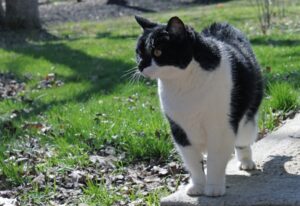As our beloved feline companions age, they experience physical, mental, and behavioral changes, just like humans do. While it can be difficult to see our cherished pets slow down, there are many things we can do to help them age comfortably and gracefully in the best health possible.
Here are a few examples of the changes your cat might encounter as they age — along with some helpful suggestions to keep your cat feeling as frisky as they did the day you brought them home.
What are some physical changes I might notice in my aging cat?
The physical symptoms that accompany aging in cats are often the most noticeable. Their once-lithe and agile bodies may gradually slow down, and their movements will become more measured and deliberate. For example, arthritis, a common ailment among older cats, makes everyday activities like jumping, climbing, and simply walking around the house more challenging.
Along with reduced mobility, most older cats naturally shed muscle mass. This often leads to a loss of strength and stamina. Older cats’ senses may also become less acute, particularly hearing and vision. These physical changes can impact their overall well-being, making it crucial for us to adapt simple changes to their care to provide support for their ever-evolving needs:
While energetic zoomies may no longer be on the table, gentle, low-impact exercise can keep your cat’s muscles toned and their joints limber. Even short sessions of interactive play can be beneficial.
It’s no one’s favorite task, but regular dental care is so important — age-related dental issues can have a significant impact on an older cat’s overall health. Get in the habit of brushing your cat’s teeth to promote good oral hygiene and prevent complications.
Finally, as cats age, their ability to regulate their body temperature becomes less efficient. Try giving your cat a heated bed to keep them warm and cozy, especially during colder months.
Behavioral issues in your senior cat
As their physical abilities decline, older cats may become less active, spending more time resting and conserving energy. But the aging process can also bring about emotional and behavioral changes in our feline companions. Cognitive dysfunction, a condition that affects memory and learning, can lead to confusion and disorientation. Anxiety, often triggered by changes in routine or environment, may manifest as excessive vocalization, pacing, or hiding. Consider these factors that provide consistency and predictability for your older cat.
- Create a stable environment: Minimize household disruptions and maintain a consistent routine to provide your cat with a sense of security and reduce anxiety.
- Provide engaging enrichment activities: Offer interactive toys and treat puzzles to keep your cat’s mind active. Interactive toys help to prevent boredom and cognitive decline.
- Stay alert for signs of anxiety: Consult your veterinarian if your cat exhibits signs of anxiety or pain, such as excessive vocalization, pacing, or hiding. They may recommend appropriate medication, natural supplements, or training strategies focused on behavioral modification.
Natural supplements can support feline health
Modern diets generally provide most of the essential nutrients your senior cat needs, but certain supplements offer additional support for an aging cat’s health. Here are some potential supplements to consider (but remember, always consult with your cat’s vet before introducing any new supplements to your cat’s diet:
- Glucosamine and chondroitin: Research shows that these naturally occurring compounds help maintain joint health and mobility, which can be particularly beneficial for older cats experiencing arthritis.
- Omega-3 fatty acids: Often found in fish oils, these essential fatty acids have anti-inflammatory properties and can support strong joint health, heart function, and cognitive function in cats.
- Shark cartilage: There is some scientific evidence to support the use of shark cartilage for joint health in elderly cats. And although more research is needed, initial studies suggest that shark cartilage could slow the growth of cancerous tumors in cats as well.
As always, check in with your vet before beginning any new routines with your cat, dietary or otherwise. They can help you fine-tune a plan especially for your pet.
Address common senior health issues with natural supplements from SeaPet
Throughout their aging journey, it is essential to maintain regular veterinary care to monitor their health, detect any underlying conditions early, and receive appropriate treatment. If you’re looking to get your senior cat’s health journey started, why not begin with dietary supplements from SeaPet? It’s perhaps the easiest way to support your cat’s health. Give your pet the chance to age gracefully and comfortably with our all-natural supplements for cats. Invest in your cat’s health now with a joint powder or fish oil designed specifically for them!
Image by Didier from Pixabay




